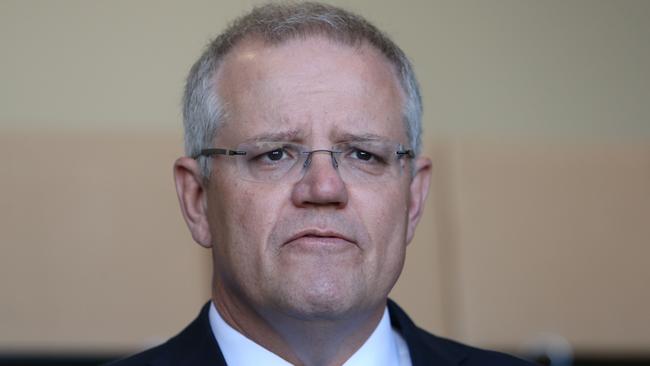Morrison in swipe at Indonesia over Jerusalem embassy
Scott Morrison has hit back at Indonesia, warning he would not be dictated to on foreign policy by another country.

Scott Morrison has hit back at Indonesia, warning he would not be dictated to on foreign policy by another country, after Malcolm Turnbull said the decision to consider moving Australia’s embassy in Israel from Tel Aviv to Jerusalem had been received badly in the world’s largest Muslim nation.
In a thinly veiled rebuke, the Prime Minister told The Australian that just as he respected the political positions of other nations including regional neighbours, he expected the same in return.
“We will determine our foreign policy … Australia will always decide its foreign policy and put our interests and values first in making those decisions,” Mr Morrison said. “We will listen to and respect the views of our neighbours. We will always respect their view about the decisions they make and the positions they take.”
The rift over one of the most sensitive aspects of Middle East foreign policy opened up a new round of government in-fighting, with Coalition MPs voicing their anger at Mr Turnbull’s intervention. But Julie Bishop backed his opposition to moving the Australian embassy to Jerusalem.
Bill Shorten said discord between Mr Turnbull and Mr Morrison had reduced Australia to an international “laughing stock”.
Mr Turnbull, who is no longer an MP and was sent by Mr Morrison as his envoy to the Our Ocean Conference in Bali to ensure a bilateral free trade deal goes ahead, used the opportunity to warn that an embassy relocation would be “met with a very negative reaction in Indonesia”.
Following a meeting on Monday with Indonesian President Joko Widodo, Mr Turnbull said the Indonesian leader had serious concerns about Australia’s policy review. “There is no question, were that move to occur, it would be met with a very negative reaction in Indonesia. This is, after all, the largest Muslim-majority country in the world,” he said.
Mr Morrison dismissed Mr Turnbull’s concerns and said he would follow a “proper process before making any decision’’.
Ms Bishop, the foreign minister under Mr Turnbull, previously declined to comment on the potential embassy move, which she had resisted in office, saying last week that new leaders were entitled to review foreign policy.
But in the wake of Mr Turnbull’s warning Ms Bishop told The Australian: “My position was made clear as foreign minister.”
As recently as June, she argued against relocating the embassy. “Jerusalem is a final status issue and we have maintained that position for decades,” she said.
Victorian senator James Paterson, a long-time supporter of the embassy move, said Mr Turnbull should have stuck with the government’s line. “If you are going to be representing the Australian government at international forums, I think there’s an obligation to uphold the policy of the Australian government,” he said.
Nationals MP and former deputy prime minister Barnaby Joyce also voiced concern about Mr Turnbull’s comments, even though he had previously raised concerns about handling the issue with care in regards to Indonesia, where Australia exports agricultural products.
“It stands to reason that Mr Turnbull cannot just switch from prime minister to citizen now, and of course he’s going to be highly tempted to articulate not the current government’s views but his former positions,” Mr Joyce said.
Queensland Liberal MP Luke Howarth, who was prepared to move a spill motion against Mr Turnbull in the joint partyroom, said Australia should go ahead with the move despite the threat of economic consequences.
“I think Indonesia understands our special relationship with Israel in the Middle East, and we have to do what we think is right,” he said.
Christopher Pyne backed the Prime Minister yesterday. The Defence Minister said his international counterparts had not raised concerns with him at a recent international meeting.
Evan Laksmana, a researcher at Indonesia’s Centre for Strategic and International Studies, said it was in Australia’s interest not to follow through with the move as it could delay the signing of the Indonesia free-trade deal and assist Mr Widodo’s opponents.


